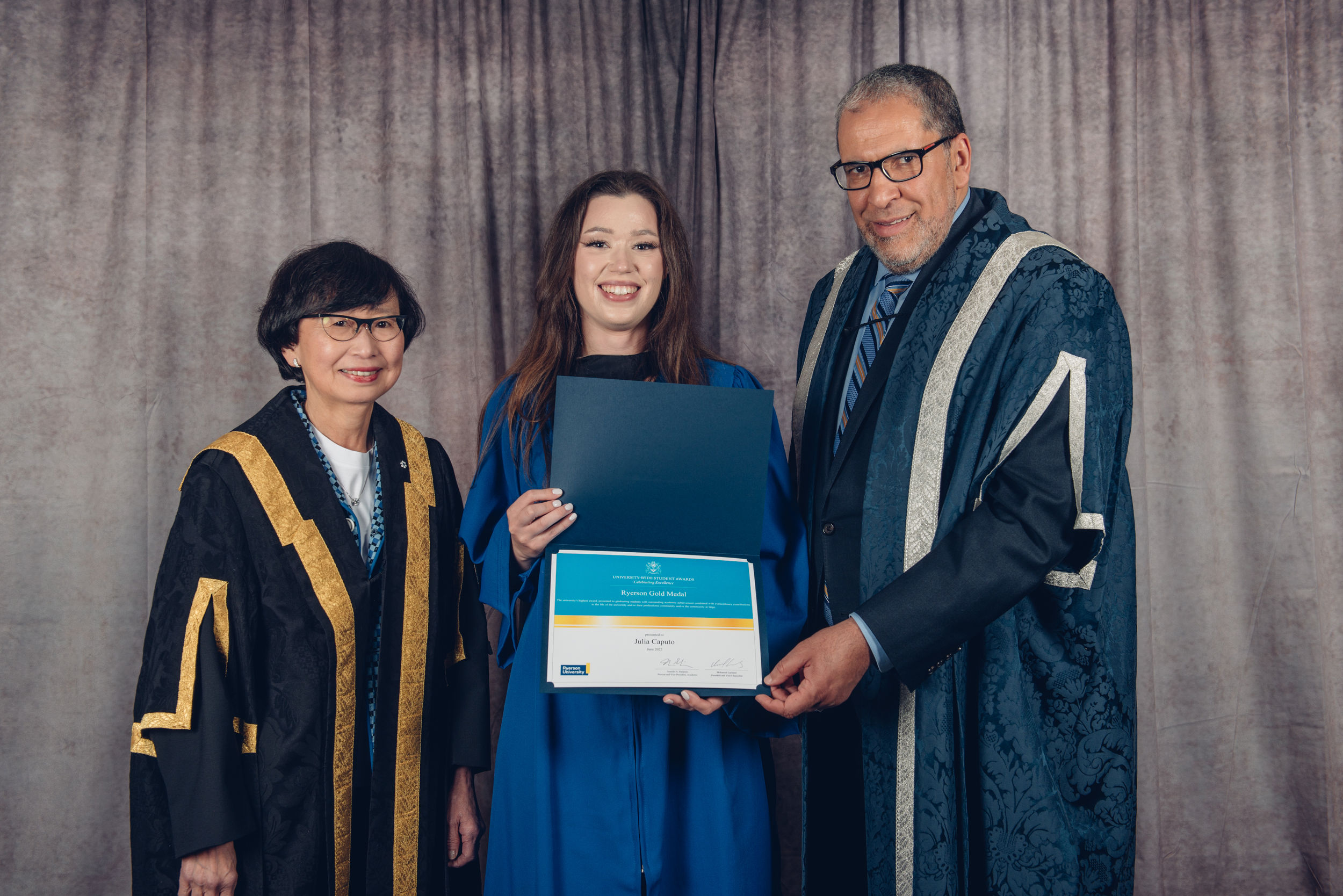Criminology student Julia Caputo awarded 2022 TMU Gold Medal for the Faculty of Arts

Chancellor Janice Fukakusa (left), and President Mohamed Lachemi (right) award Criminology student Julia Caputo with Faculty of Arts Gold medal in June 2022.
For Julia, social justice isn’t just something learned in the classroom, it’s a way of life. That commitment powered her exceptional academic performance and community activism. The Criminology graduate received the TMU Gold Medal for the Faculty of Arts, the most prestigious award offered to graduating students. Recipients are selected on the basis of outstanding academic achievement and participation in co-curricular and extracurricular activities within TMU and/or the community at large.
Discovering an unexpected side of criminology - and a mentor
Julia was drawn to Criminology after discovering that it was about much more than “case studies on criminals and learning about the ins and outs of the courts and corrections. The way that it's taught at TMU is very focused on the inequalities in our system, the gaps. That is what I’ve been most focused on in my studies – racism and inequality.”
“She’s one of those rare students that you meet, and you think, this is it, this is the student,” says Dr. Anne-Marie Singh, a professor in the Department of Criminology, of her encounter with Julia as a first-year student. “She was always prepared for class, always had something thoughtful to say. I am so proud of what she has achieved, and excited to see where she goes from here.”
Originally majoring in history, Julia switched into Criminology after being inspired by her introductory class with Dr. Singh. Over the course of her undergraduate degree, the relationship became an integral part of Julia’s experience and success at TMU, who says her experience at TMU would not be the same without Dr. Singh.
“I took every one of her courses that I could,” Julia recalls. “Most of the opportunities to be involved in projects and research came directly from her.”
Passion for social justice inspires equity leadership
Those research projects and initiatives focused on fostering equity, diversity and community inclusion.
“I really enjoy all of the work that I’m doing, because these are issues that are deeply important to me,” said Julia. “I want to make a worthwhile contribution, even in the smallest way possible, to make our community a better place.”
As part of a team of students working with Dr. Singh, Julia investigated Egerton Ryerson’s role in residential and Black segregated schools in what is now Ontario. She helped develop an annotated bibliography on Black segregated schools, which is included on the library’s Black Studies Research Guide. Julia also assisted in the production of the Know Your Place (external link) infographic, which examined Egerton Ryerson’s role in anti-Indigenous and anti-Black racism in public education in Ontario.
“If we want a future that’s more equitable and inclusive, we actually need to know this history,” Julia notes. “Everyone should know the history behind names, people and places. They all tell a story that is different from the one we know.”
Strengthening the anti-racism conversation
Julia continued this work in a Community-Engaged Learning and Teaching project as part of a fourth-year seminar Criminology class, “Public Criminologies”. The project was a collaboration with the Faculty Association’s Equity and Professional Affairs Committees focused on planning a series of events to transform the university classroom by confronting racial trauma. Julia helped organize a student-only webinar on racism in the classroom.
Taking these projects out of the classroom and into the university and public discourse on anti-racism was important to Julia and her collaborators: “We wanted to address the knowledge gap in the broader university community’s understanding of anti-Black and anti-Indigenous racism.”
The hope is for this anti-racism event to become an annual touchpoint for students and community members.
“She volunteered her time because she understood the importance of educating the university community and the broader public about the colonial history of this university,” comments Dr. Singh.
Julia’s commitment to advocating for change extends beyond university walls. At Girls inc (external link) , she is supporting the needs of girls from low-income communities and girls facing multiple, intersectional challenges including and especially sexual violence, homophobia and transphobia. As a Crisis Responder at Kids Help phone (external link) , Julia also teaches coping strategies and co-devises safety plans with youth in distress.
While many students may face major difficulty grappling with identity and other personal challenges alongside their studies, Julia actively recognizes the interconnectedness of her queerness, gendered expectations, personal adversity and her privilege in her pursuit of social justice.
Continuing anti-racism impact through a career in law
All of these experiences have solidified Julia’s determination to make a difference in her career. “The goal is to become a lawyer,” she said, “and a human rights lawyer is high on the list.”
She sees this path as a way to help create more equitable futures for the communities about which she cares so deeply.
Julia is also continuing her community activism, with a focus on the origins of name, place and people. Currently, she is working to help reclaim the history of buried or otherwise erased waterways connected to the territory that TMU now occupies. “I think everyone at TMU should know about the Creek and its significance. We are hoping to find a way to showcase this history on campus, so it can live on in our community.”